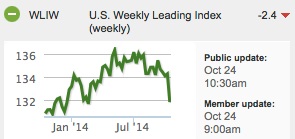 The Fed has its critics, of course, and its unique constitutional dispensation is challenged from time to time, but its political independence is mostly seen as a good thing. Yet the idea of replicating that idea, and creating other permanent, semi-independent policy-making agencies, almost never comes up. There’s a reason for that. It’s hard to imagine that an independent fiscal agency, for instance, would ever be allowed to do for U. S. budget policy what the Fed does for interest rates. Decisions about taxes and spending – about who gets what and who pays – are too contentious, too close to the core of democratic politics. Congress will never permanently delegate them the way it’s delegated monetary policy. However, a bit more power-sharing might be possible, and that would be better than nothing. – Bloomberg
The Fed has its critics, of course, and its unique constitutional dispensation is challenged from time to time, but its political independence is mostly seen as a good thing. Yet the idea of replicating that idea, and creating other permanent, semi-independent policy-making agencies, almost never comes up. There’s a reason for that. It’s hard to imagine that an independent fiscal agency, for instance, would ever be allowed to do for U. S. budget policy what the Fed does for interest rates. Decisions about taxes and spending – about who gets what and who pays – are too contentious, too close to the core of democratic politics. Congress will never permanently delegate them the way it’s delegated monetary policy. However, a bit more power-sharing might be possible, and that would be better than nothing. – Bloomberg
Dominant Social Theme: Technocracy is the hope of the future.
Free-Market Analysis: Call technocracy, the idea of a select group of private individuals running public affairs privately, the meme that will never die.
Now again, almost randomly, comes a call for action.
This one is uttered by someone called Clive Crook who has attended all the right colleges, worked for all the right internationalist publications and has decided absurdly that the example of the “independent” Federal Reserve ought to be extended to various failing government agencies.
We can see from the above excerpt that Mr. Cook is well aware that his affection for technocracy will not translate into reality, not fully anyway. But, he suggests, “a bit more power sharing might be possible.” In this case, he means between private implementation of public policy and government implementation.
Before going further, let’s look at the modern history of technocracy. We write “modern” because this idea goes back all the way to Plato and his idea of “philosopher kings.” Plato believed that philosophers, whom he differentiated from ordinary people because of their access to “wisdom,” were most fit to rule society.
By making this distinction, anointing some as better able to rule and wield power than others, Plato assured himself literary immortality. This is because every man or woman who has risen to a seat of great power has wished to use Plato’s formulation to justify their ascension.
This post was published at The Daily Bell on October 28, 2014.
 Last month’s sudden plunge (and biggest miss since Jan 2012) in Conference Board consumer confidence merely enabled an even bigger bounce this month. Consumer confidence surged to 94.5, its highest since October 2007, beating by the most since April 2013 (amid Ebola outbreaks). While the current situation was relatively flat, the surge in the headline data was purely due to a huge spike in future expectations from 83.7 to 95.0 – the highest since Feb 2011. Oddly, fewer people are likely to buy a car, major appliance, or house in the next 6 months but survey respondents expect a surge in incomes?
Last month’s sudden plunge (and biggest miss since Jan 2012) in Conference Board consumer confidence merely enabled an even bigger bounce this month. Consumer confidence surged to 94.5, its highest since October 2007, beating by the most since April 2013 (amid Ebola outbreaks). While the current situation was relatively flat, the surge in the headline data was purely due to a huge spike in future expectations from 83.7 to 95.0 – the highest since Feb 2011. Oddly, fewer people are likely to buy a car, major appliance, or house in the next 6 months but survey respondents expect a surge in incomes?
















 Follow on Twitter
Follow on Twitter
Recent Comments